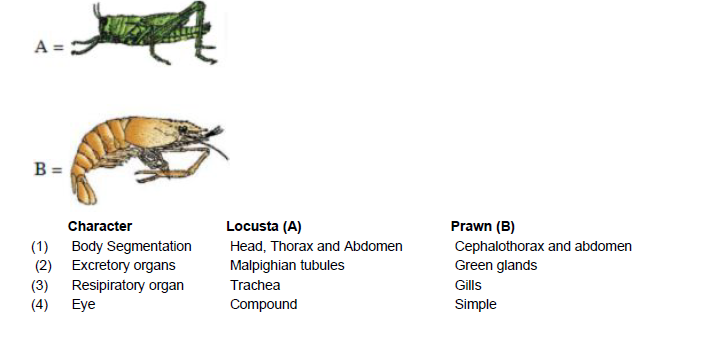Palaemon (Prawn) is a
Insect
Crustacean
Soft shelled mollusc
Fish
The correct Answer is:B
Palaeomon (Prawn) is a crustacean class of phylum arthropoda. The body is divisible into cephalothoraxes and abdomen and respiration through gills.
Similar Questions
Knowledge Check
Assertion : Rhabdome is present in Palaemon.
Reason : Rhabdome has an important role in digestion.AIf both assertion and reason are true and reason is the correct explanation of assertionBIf both assertion and reason are true but reason is not the correct explanation of assertionCIf assertion is true but reason is falseDIf both assertion and reson are false.Assertion Prawn have walking legs .
Reason Prawn can swim with the help of walking legs .AIf both Assertion and Reason are true and Reason is the correct explanation of AssertionBIf both Assertion and Reason are true , but Reason is not the correct explanation of AssertionCIf Assertion is true , but Reason is falseDIf Assertion is false , but Reason is trueFeatures common in Silver fish, Scorpion, Dragonfly and Prawn are
AThree pairs of legs and segmented bodyBChitinous cuticle and two pairs of antennaeCJointed appendages and chitinous exoskeletonDCephalothroax and tracheae.
Write the scientific name of :
(a) Prawn , (b) House fly , (c) Star fish , (d) Squid , (e) Appple snail , (f) Fresh water mussel.
View SolutionIndicate whether the following statements are true of false : (a) Both auricles of amphibian heart open into the same ventricle.
(b) Prawn's heart carries only oxygenated blood.
(c ) Purkinje fibres are nerve fibres supplying the ventricular muscles.
(d) The first heart sound results from a closure of semilunar valves.
(e ) The vagus nerve reduces the heart rate.
(f) The A-V node normally initiates the cardiac impulse.
(g) Semilunar valves open during the ventricular diastole.
View SolutionWhich of the following is not correct comparison between Locusta (A) and Prawn (B), illustrated in the following diagram?

View SolutionRead the following passage and answer the questions that follow :
Aesop prawns start life as colourless, almost transparent infants who drift with the tide. On reaching maturity, they drift inshore, reach out to grasp the first passing seaweed and, once established upon it, they proceed to colour themselves to blend with it. After a week, their colouring is complete and they are safe from the closest scrutiny. Should disaster strike and their chosen home be destroyed, they first try to find a new home with the same colour scheme as the first. If this proves impossible, they philosophically settle for a different coloured home and restart their own colouring process. A week zips past --- and they change colour to merge beautifully with their new homes once again. Aesop prawns also take on the colours of the day. Regularly at nightfall, they change to a deep transparent blue, reverting to their chosen house-colour as the sea lightens at dawn. Interestingly, the decision to adopt a particular colour is in no way an act of will on the part of the prawn. Scattered over its body surface are small pigment cells, each containing a central bag of colours (a reservoir of primary pigments: red, yellow and blue) with five branches extending from it. These pigment cells are influenced by the light that falls directly on them or enters through the prawn's eyes. Different coloured lights activate the hormones that control the flow of pigments. And after dark, red and yellow are withdrawn to make way for the nocturnal blue 'night suit' of the Aesop prawn. A system that provides the animal, at all times, with an enviable cloak of invisibility.
The unique feature of Aesop prawns is that_
View SolutionGiant fresh water prawn is
View Solution
